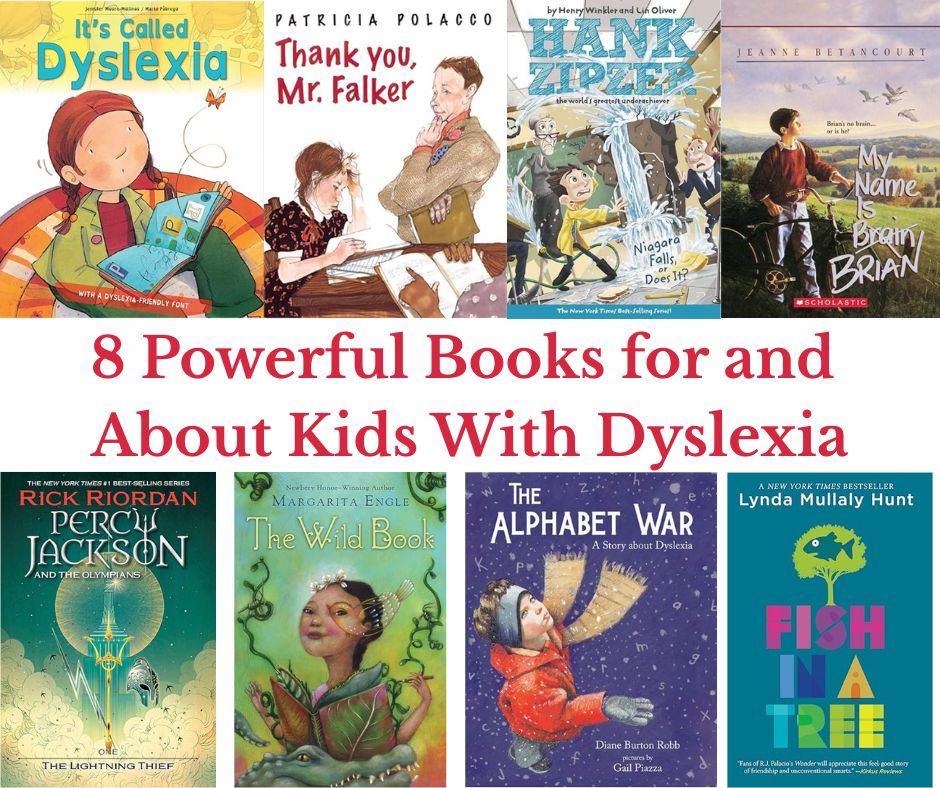Finding books that help your child understand their experience with dyslexia can be incredibly powerful. Whether they’re learning about their diagnosis, building confidence, or just wanting to see someone like them succeed, the right book can make a big difference.
Below are 8 kid-approved books that either explain dyslexia or feature characters who have it. These stories offer encouragement, empathy, and hope—plus they’re great reads! The list also includes a few discussion questions to help you and your child connect in a positive way.
Want to download the list and discussion questions? Click here.

1. Fish in a Tree by Lynda Mullaly Hunt
- Summary: Ally hides her reading struggles by acting out, but a new teacher helps her see her dyslexia in a new light.
- Themes: Growth mindset, self-worth, learning differences, power of a good teacher.
- Ages: 9–12
- Discussion Questions:
- Have you ever felt like Ally—trying to hide something that’s hard for you?
- What made Ally start to believe in herself?
- What kind of support helps you learn best?
2. Thank You, Mr. Falker by Patricia Polacco
- Summary: A picture book based on the author’s life, showing how a teacher helped her overcome reading struggles caused by dyslexia.
- Themes: Perseverance, teacher impact, hope, confidence.
- Ages: 5–9
- Discussion Questions:
- How did Trisha feel before Mr. Falker helped her?
- Why do you think she didn’t tell anyone she was struggling?
- What’s one thing a teacher or parent has done that helped you?
3. Hank Zipzer series by Henry Winkler & Lin Oliver
- Summary: Hank is a clever and hilarious fourth grader who has dyslexia. His misadventures highlight the highs and lows of learning differently.
- Themes: Humor, self-acceptance, resilience, friendship.
- Ages: 7–10
- Discussion Questions:
- What makes Hank a great problem solver even if school is hard?
- How does Hank’s dyslexia affect how he sees himself—and how others see him?
- When do you feel proud of how you figured something out in your own way?
4. My Name Is Brain Brian by Jeanne Betancourt
- Summary: Brian doesn’t understand why school is difficult until a dyslexia diagnosis helps him get the support he needs to thrive.
- Themes: Identity, acceptance, advocacy, friendship.
- Ages: 9–12
- Discussion Questions:
- Why did Brian feel embarrassed about school?
- How did things change for him once he understood his learning difference?
- What would you want your teacher or friends to understand about how you learn?
5. The Alphabet War by Diane Burton Robb
- Summary: Adam fights an “alphabet war” with reading until he begins working with a reading teacher and sees progress.
- Themes: Persistence, frustration, patience, support.
- Ages: 5–8
- Discussion Questions:
- What part of the “alphabet war” felt familiar to you?
- How did Adam feel when he finally started to make progress?
- What helps you keep going when something feels really hard?
6. It’s Called Dyslexia by Jennifer Moore-Mallinos
- Summary: A picture book that clearly explains what dyslexia is, helping kids understand their diagnosis and that they’re not alone.
- Themes: Self-understanding, emotional awareness, normalizing differences.
- Ages: 6–9
- Discussion Questions:
- Did this book help you understand dyslexia better?
- What makes you feel strong, even if reading is hard?
- How would you describe dyslexia to a friend?
7. Percy Jackson & the Olympians by Rick Riordan
- Summary: Percy has dyslexia and ADHD—because he’s a demigod. His learning differences are actually his greatest gifts.
- Themes: Bravery, identity, reframing challenges, belonging.
- Ages: 10–14
- Discussion Questions:
- How did Percy turn his differences into strengths?
- Do you think having dyslexia could help you see the world in a different way?
- What would your “superpower” be if your brain worked like Percy’s?
8. The Wild Book by Margarita Engle
- Summary: Set in early 1900s Cuba, this novel-in-verse tells the story of Fefa, a girl with dyslexia who finds her voice through poetry and nature.
- Themes: Creativity, cultural identity, resilience, family.
- Ages: 9–13
- Discussion Questions:
- How did writing poetry help Fefa deal with dyslexia?
- What do you think makes Fefa brave?
- Is there something creative or expressive that helps you when you’re frustrated?
Want a printable version of this list and discussion questions? [Download our free handout here.]
Encouragement for Parents
Remember, dyslexia doesn’t define your child—it shapes a unique and beautiful way of thinking. These books will help your kids feel seen, heard, and empowered.
Do you have any favorite books about or for kids with dyslexia? Leave a comment below!
Looking for more dyslexia-friendly resources? Check out my Amazon Storefront where I’ve collected some of my favorite resources for learning and play especially helpful for kids with dyslexia and ADHD.






The Pony Pals series, also by Jeanne Betancourt, has a dyslexic character. The second book focuses on the dyslexia, and it plays a smaller part in the other books.
A Walk in the Words by Hudson Talbot is a good one. Thanks for all your resources!